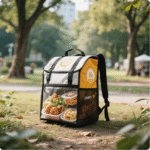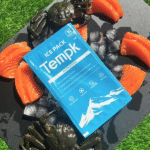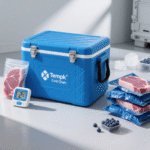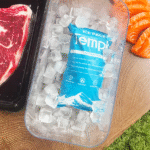Dans le monde au rythme rapide d'aujourd'hui, Les services de livraison de nourriture sont plus populaires que jamais. Que vous soyez chef d'entreprise ou particulier, La capacité de conserver les repas à la température idéale pendant le transport est cruciale. C'est là que les sacs isolés alimentaires entrent en jeu. Conçu pour préserver la température des articles chauds ou froids, Ces sacs sont essentiels pour assurer la qualité des aliments et la satisfaction des clients.
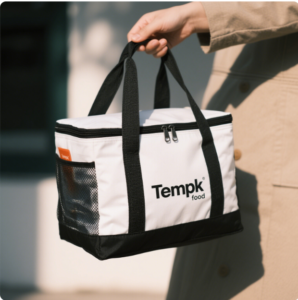
Pourquoi avez-vous besoin Sacs à isolation alimentaire?
Les sacs à isolation alimentaire sont spécialement conçus pour maintenir la température des aliments pendant le transit. Ils sont idéaux pour diverses utilisations, des services de livraison de nourriture à la restauration et à la préparation des repas. Sans isolation appropriée, La nourriture peut perdre sa température optimale, affectant son goût, texture, et la sécurité. Par exemple, Les aliments chauds comme la pizza ou les pâtes peuvent se refroidir trop rapidement, tandis que les articles froids comme les salades ou les boissons peuvent se réchauffer, diminuer leur qualité.
Les sacs de nourriture isolés empêchent ces problèmes, Garder vos repas frais, chaud, ou froid jusqu'à ce qu'ils atteignent leur destination. Cela en fait un outil essentiel pour quiconque cherche à maintenir la qualité des aliments pendant le transport..
Principales caractéristiques des sacs isothermes pour aliments
-
Isolation thermique:
La caractéristique la plus importante des sacs isothermes alimentaires est leur capacité à maintenir la température des aliments.. Ces sacs sont doublés de matériaux thermiques de haute qualité comme la mousse, feuille d'aluminium, ou des doublures réfléchissantes qui emprisonnent la chaleur des aliments chauds et gardent les aliments froids au frais. -
Durabilité:
Les sacs isothermes alimentaires sont fabriqués à partir de matériaux robustes, matériaux durables tels que le polyester, nylon, ou (Polyéthylène). Ces matériaux résistent à l'usure, garantir que les sacs peuvent être utilisés à plusieurs reprises sans compromettre les performances. -
Taille et polyvalence:
Les sacs alimentaires isothermes sont disponibles dans une gamme de tailles, des sacs plus petits pour des repas individuels aux sacs plus grands pouvant contenir plusieurs contenants. Cette polyvalence les rend adaptés à une grande variété d’applications, y compris la livraison de nourriture, événements de restauration, et transport d'épicerie. -
Étanche et anti-déversement:
Les déversements sont une préoccupation courante lors du transport de nourriture, surtout pour les soupes, sauces, ou boissons. De nombreux sacs isothermes pour aliments sont conçus pour être étanches ou résistants aux déversements., s'assurer que tous les dégâts potentiels sont contenus dans le sac. -
Facile à nettoyer:
L'hygiène est une priorité absolue dans l'industrie agroalimentaire, et les sacs isothermes alimentaires sont faciles à nettoyer. Avec des matériaux pouvant être essuyés ou lavés, garder ces sacs hygiéniques est simple et pratique.
Matériaux utilisés dans les sacs isothermes alimentaires
-
Polyester:
Un matériau couramment utilisé pour la couche externe des sacs isothermes alimentaires, le polyester est léger, durable, et résistant à l'humidité. C’est parfait pour garantir que les sacs restent fonctionnels même après une utilisation répétée. -
Nylon:
Le nylon est un matériau solide, matériau résistant à la déchirure qui est souvent utilisé pour la doublure intérieure des sacs isothermes alimentaires. Il offre une protection supplémentaire aux aliments et ajoute à la durabilité globale du sac.. -
Isolation thermique:
L'élément le plus critique d'un sac isotherme, des matériaux comme la mousse et les doublures réfléchissantes aident à conserver la température des aliments à l'intérieur. L'isolation en mousse est excellente pour prévenir les pertes de chaleur, tandis que les doublures réfléchissantes minimisent les échanges thermiques externes.
Avantages de l'utilisation de sacs isothermes pour aliments
-
Maintenir la température des aliments:
Le principal avantage de l’utilisation de sacs isothermes alimentaires est qu’ils aident à maintenir la température souhaitée de vos repas.. Que vous ayez besoin de conserver des aliments au chaud ou au froid, ces sacs garantissent que les aliments sont transportés dans des conditions optimales. -
Prévenir les déversements et les fuites:
Avec des conceptions étanches, les sacs isothermes pour aliments garantissent que les articles à base de liquide sont transportés en toute sécurité. Cela évite tout gâchis ou déversement, garder les sacs et la nourriture propres pendant le voyage. -
Efficacité accrue:
Les sacs isothermes améliorent l'efficacité des services de livraison de nourriture en gardant les repas organisés et à la bonne température.. Cela permet aux chauffeurs-livreurs de se concentrer sur leurs itinéraires sans se soucier des problèmes liés à la température.. -
Écologique et rentable:
Les sacs isothermes alimentaires sont une option durable, réduisant le besoin d’emballages jetables. Réutilisable et durable, ces sacs offrent une solution rentable pour les entreprises et les consommateurs.
Sacs thermiques de Tempk: La solution idéale pour l’isolation alimentaire
À Rotation, nous comprenons l'importance de garder vos aliments à la bonne température pendant le transport. Notre sacs thermiques sont conçus avec des matériaux isolants de qualité supérieure pour garantir que les aliments chauds restent chauds et les articles froids restent frais.. Que vous soyez un restaurant cherchant à améliorer votre service de livraison ou un particulier ayant besoin d'un transport de nourriture fiable., Les sacs thermiques Tempk sont la solution parfaite.
Nos sacs sont fabriqués à partir de matériaux durables, des matériaux de haute qualité conçus pour durer, offrant d'excellentes performances jour après jour. En plus, nos sacs isothermes sont faciles à nettoyer, veiller à ce que l’hygiène ne soit jamais compromise. Les sacs Tempk peuvent également être personnalisés avec votre marque, donner une apparence professionnelle à votre entreprise tout en assurant le transport sécuritaire de vos aliments.
Conclusion
Les sacs isothermes alimentaires sont essentiels pour maintenir la qualité et la sécurité des repas pendant le transport. Que vous exploitiez un service de livraison de nourriture ou que vous ayez simplement besoin d'un moyen fiable de transporter vos courses., ces sacs offrent la solution parfaite. Avec leur isolation supérieure, durabilité, et facilité d'utilisation, Les sacs thermiques Tempk fournissent tout ce dont vous avez besoin pour garder vos repas frais et à la température idéale. Choisissez Tempk pour des sacs thermiques de haute qualité qui rendent la livraison de nourriture plus efficace et fiable.
















